|
[Previous
Page]
The Park Street Store.
CHAPTER VI.
|
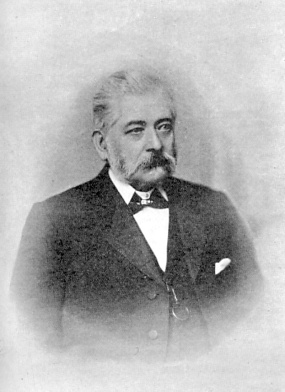 |
|
A. SCOTTON. |
LABOUR
HALL was a likely name to attract men whose object
was to raise the order of labour. It was a one storey, very plain,
conventicle-looking place. It had been used for humble purposes such
as its name implied. The entrance to it was up steps, though less
steep and rude than those of George Yard and Full Street. Victoria
Street was the only stepless store they had had. That was a ground
floor warehouse. For the first time the pioneers had now an entrance
from the street, and ranked so far with other shopkeepers, though their
customers had to climb steps, and they had no front windows in which to
show their goods. Indeed they had no wall windows at all, the
building being lighted from the roof. For the present, anyhow, they
had escaped from back yards. At the top of the steps a door opened
on to the hall floor. Underneath was a room of commensurate size,
used at times as a dancing-room. Such were the premises of the new
branch in a thoroughfare. The store remains there to this day, with
some few alterations to be hereafter indicated.
The reader has seen how the society became possessed of the
Labour Hall, and now held a freehold place of business. It was not
in good condition and needed repairs before occupation. These were
effected. It was fitted up in away befitting its modest pretension,
the work being done by members of the society after their regular day's
work was over. The first Branch was opened on Thursday, July 18th,
1861, but it was appointed to be opened on July 11th. It was ready a
week later, with regular paid servants, Mr. Hardy being shopman.
Business was done in ordinary hours, as in other shops in the town.
Mr. Scotton was appointed to assist at the opening, and felt a little
proud to be the taker of the first cash there. Afterwards he and Mr,
Swift were appointed to attend in the evenings to enrol members. The
place now ceased to be known as the Labour Hall, and became the Park
Street Co-operative Store.
The story of the first Branch has an interest all its own.
Many were the misgivings of all concerned as to the result of this
enterprise.
The first year in Full Street, despite the many disadvantages
of the place, developed unforeseen signs of growth. The first year in Park
Street proved the wisdom and intrepidity of the new venture. In the
December quarter of 1860, 290 members were enrolled, and £463. 14s. was
received in contributions for shares. In 1867 the total membership had
risen to 706, and the sales that quarter reached £2,560, an increase over
the previous quarter of £767, at which the hearts of the members greatly
rejoiced, for after paying 5 per cent on shares, and 2½ per cent for
depreciation of fixed stock, the dividend reached what in those days was
thought magnificent, 1s. 8d. in the £. The society had found the secret of
making money, and demonstrated to the town that co-operation meant profit. Previous to the opening of the Park Street Store, the receipts had been
about £63 a week. In June, 1862, the receipts had increased to £450 a
week.
This was not accomplished by sleight of hand, but by toil of hand and toil
of thought. The committee did not spare themselves. Desirous of
economising, they bethought themselves that instead of buying bacon, they might kill their own pigs.
Underneath the meeting room of the Labour Hall, which, as we have said,
was ascended by stairs, was a large room. One member fitted up a copper in
it to boil the water for scalding the pigs; but being an amateur, there
were defects in the construction of it, and it was difficult to get the
water
to boil. One evening the committee assembled at Park Street
to superintend the slaughter of a pig. The amateur butcher did not
understand his work, and was uncertain where the fatal stab should be
given. One of the committee, who thought he knew, pointed with his walking
stick to what he considered the right spot, but the pig resented the
entire proceeding, and suddenly veered round so swiftly, that the stick
pointed to the
opposite extremity of the turbulent animal. It was late before
the operations were all over, and all the committee left save two, who
remained to clear up the place a little, when they discovered all too
late, that the amateur operator had gone home taking the key of the store,
and neither knew where he lived. It was impossible to them to expose the
little property of the society unprotected, and the two committee-men sat
up all night with the pig.
Such an adventure was not likely to remain secret, and the next day the
amateur delinquents were saluted with squeals from the members, who had
learned what had happened, whereas they deserved praise rather than
ridicule for their fidelity, and for the trouble they had incurred by
their night watch for the preservation of the society's property. A
caricature of the scene, in the underground room of the Labour Hall, was
another feature of the untoward merriment. All the same there were comic
aspects in the adventure. The co-operators showed great skill in their
undertakings, but pig killing was not one of their attainments. However,
the pig killing question lasted for some time, and appeared in many
minutes. Two years later Mr. Wilford's resignation on the "Pig killing
committee" was recorded. A pig killing committee seems to have been
started. Another minute records "That Mrs. Newbold's terms are to be
ascertained, and whether she will let her pig sty." A further minute
says—"In future no refreshment whatever be allowed to any persons killing
pigs at the society's expense, and a new butcher or meat man is to be
obtained." It is clear the society suspected a leakage somewhere. Pigs
seem to have been a great trouble to the committee from the beginning.
At length it was resolved, "That the pay of the committee be 10s. a
quarter," not much certainly, less than 1s. a night, less than a mechanic
would expect for two hours over work. In the case of the committee, the
best faculties of the mind had to be employed for promotion of the
interests of the society. The nights often prolonged, deputations have to
be gone upon, and attendance in the chair or on the platform of public
meetings, often at a distance, have to be given by members of committee.
It is ever strange that working men, whose policy it is to have good
wages, are seldom forward to give good wages themselves, to those in their
service, which is setting a bad example to their employers; still, though
the resolution did not go far, it showed, on the part of members, a rising
sense of
business and self-respect, and that they no longer desired to have their
affairs managed by charity, which is always against success. The committee
became established at Park Street, and met again in a very small room. The
committee ceased any longer to meet in Full Street.
The vigilance of the committee not only brought the members profit, but
prevented loss. In 1861 the society issued paper checks representing the
amount of purchases. Counter
foils were kept in the shopman's book. A woman presented at
the Park Street Branch checks for £6. Mr. Scotton, one of the examining
committee (there were two others—Messrs. Wilford and Cresswell) found a
figure added to several, making the 1s.
check to represent 11s. The woman was arrested and when the case was
tried, the judge consulted with the counsel, and dismissed the accused. It
appeared there was no law recognising forged checks to claim dividends,
and the judge promised to communicate with the Attorney-General with a
view to got a short Act passed, making that kind of forgery penal.
An amusing incident occurred at the trial. While the judge was engaged
writing, the jury, consisting chiefly of farmers, were seriously
deliberating in the box. The judge observing them, said, "Gentlemen, what
is your difficulty, can I assist you?" The foreman replied they could not
agree whether the prisoner was guilty or not. The judge said, "Gentlemen,
the prisoner has been gone some time and is probably now, at home." They
had not noticed the dismissal
of the accused. The society considerately resolved to recommend the
prisoner to mercy, but a better termination came to her. Later the
committee adopted metal checks and no further case occurred of the kind.
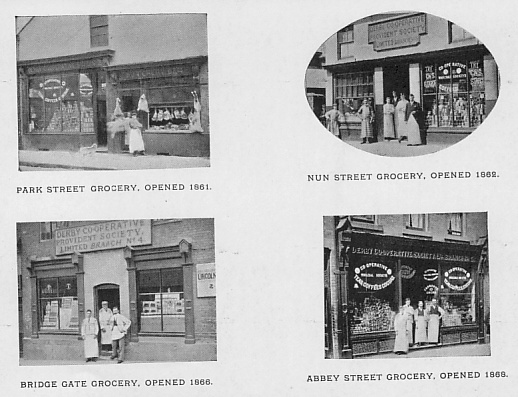
A pleasant thing was done in 1863, on the occasion of the marriage of the
Prince of Wales, who has given valued proofs of his interest in the
co-operative improvement of the people. To celebrate the advent of the
Princess Alexandra, a holiday was given to all persons in the employ of
the society, and £5 were proposed by the committee that a festive dinner
should conclude the rejoicings of the day.
It is recorded "that the registered office be Park Street, according to
Act of Parliament." A committee (on which were Messrs. Scotton, Mather,
and Swift) was appointed to revise the rules, which were duly certified by
the Registrar. Revision and amendments have to be made by every
society as its business advances (as late as 1899 important amendments
were under consideration.) The society in 1863 came under the new rules. The whole of
the committee then vacated office. On voting, the following persons were
elected on the committee: W. Wilford, T. Barrodell, W. Slater, A. Scotton,
G. Wright, W. Ashindle, W. Corner, H. Barrett, T. Sherwin, T. Cresswell,
and W. Hemm, in the order here named. On July 24th, 1863, the
committee-men of each store were requested to have their names posted in
each store, for the purpose of members making complaints or asking
questions, which shows the equality cultivated in the society, and that
the suggestions made by members for improvement in any respect, would be
received with friendliness by the committee. On opening the Park Street
Branch, a manager was appointed. It is the first time a "manager" was
mentioned. They early resolved to stop giving credit, into which they had
fallen, it being contrary to co-operative profession, and opposed to
thrift, economy, and independence, for he who is in debt is owned by
somebody else.
In those days of enthusiasm, imagination was very active. The Park Street
Store being the first possession of the society, the little freehold was
thought to be capable of everything, and a question was brought before the
committee of erecting a bakehouse at Park Street. The bakehouse question
was destined often to come before the committee.
Eventually, alterations in Park Street were resolved upon, and were to be
completed in three weeks, under a penalty of £3 a day beyond that time. Mr.
Brown's contract was accepted, and a radical change of front was
contemplated. The "floor was to be made level with the street," Park
Street is the place meant though not named in the minutes. By lowering the
floor the old Hall gained in loftiness of appearance, and the old
dancing-room, the scene of festive and tragic events as we have related,
lost in height; but the shop is made level with the street, the steps are
abolished, and customers can enter as they would at other shops. The
floor-lowered room makes a commodious place of business, as may be seen to
this day.
This chapter is designed to include only the earlier days of the Park
Street Branch. The society flourished here and grew in favour with the
members, and acquired position in the town. Its march was onwards. Extension was always its watchword. In due course the committee had in
view to open
a second branch. The Dove Inn was advertised for sale by contract, the
reserve price £1,200, and the society bought it.
They were in no want of a public house. The Dove Inn was an innocent name,
but if doves drank much beer they would not be very innocent, and if
co-operators were given that way, they would not have much money to spend
at the store. There were, however, back premises attached to the Inn
property, out of which, or in which, a store could be made. There were not
many trees to be seen in Park Street, and there
were no nuns in Nun Street. It was a pretty one-syllable name, and in that
street the second branch was established.
The Nun Street Branch.
CHAPTER VII.
THE Nun Street Store was established in a building which again stood back
from the main street. The co-operators had no reason to regret coming to
the front in Park Street, but they were for the fourth time up a passage,
and the Nun Street Store, like all the previous ones (save Victoria
Street) was on a second storey, in the rear of
the Dove Inn. The ascent to the store was again up steps
from the outside. The entrance from the street was through
a narrow passage, which still remains. There were windows in the rooms
occupied by the store, but they looked into the
public house yard. The premises had been used previously
as a clubroom and dancing-room. The society converted the dancing-room
into a store, and the room beneath, which was windowless, into a
warehouse. The Nun Street Store was opened in June, 1862, and new business
soon rewarded the enterprise of the committee. Mr. Scotton—who was always
at the door or altar of a new temple when initiatory ceremonies had to be
performed—was, with Mr. Hilliard and Mr. Mather, appointed to pay the
first dividends at Nun Street. It was done in the warehouse underneath the
store.
In what a plain, humble way business had to be conducted there is seen in
circumstances under which dividends were paid. Never was a more weird or
humble
banking house. There was no gas in the warehouse, nor any
counter or desk. Two empty flour barrels were turned bottom up, and
candles put in ginger beer bottles, furnished the light whereby the
paymasters of the co-operative forces discharged their duties. But
before dividends could be paid they had to be earned. The method by
which they accrued will best be shown by continuing the narrative of the
proceedings of the directors.
The butcher, the baker, and the pig soon came into the minds
of the committee, if, indeed, they were ever out of their thoughts.
Mr. Brown was engaged to put up an oven, and the society began baking its
own bread. Baking takes precedence in the productive functions of
the store. An order was given for 300 sacks of flour. The
bakehouse was real, and was soon doing business. Next we read of a
"Baking Committee," who are instructed to examine the buns, and report.
It is notable in every department how conscientiously the
society endeavours to carry out the co-operative pledge of purity and
excellence in all things in which they deal.
In February, 1864, instructions are issued "for a Tea Party
of 500 persons." Urns are to be obtained from the Midland Railway,
who appear to be friendly to the store. Plainly there are
vegetarians on the committee, since ham sandwiches are prohibited, which
appear to have been formerly provided. The baker is to make a
specimen loaf, and say what he puts in it. The portions of currants
and raisins are enumerated, and by a special resolution he is to be
permitted to put "two eggs in each stone of bread." Truly the eggs
were not in excess. But the committee have their own ideas on that
point. Never were there such conscientious bakers. To this
day, as will be seen hereafter, the committee are honourably scrupulous as
to the quality of their provisions.
The butchers—or meat makers—largely occupy the attention of
the committee. At a later date (1871) it is ordered that they are
"to have not more than half a pound of steak allowed them on Fridays
instead of going home to dinner, and that it be left to the superintendent
to look to it." Mr. Bagnall, at a later date, is to come before the
committee, and the secretary is not to pay for the pig until after the
committee meeting. The committee are to meet at Nun Street, "to
consider an improved method of slaughtering pigs." Feelings of
humanity went with their ideas of porcine economy.
Even in matters of decoration they left nothing to
conventional fancy. The committee have special opinions thereupon.
In July, 1863, the committee, with the chairman, are desired to see to the
painting of Nun Street, which is the first mention of the Nun Street Store
in the minutes. On July 24th, it is resolved "That the windows at
Nun Street be painted white, the doors and shutters are to be of dark
grained oak in oil, the spouting and store door to be painted stone
colour." The effect of coming into the open in Park Street for
business has had its results. The committee begin to show taste and
public daintiness. Probably the committee included experts of the
brush among its members. Mr. Walker is "to have the painting of Nun
Street for £3, and no money is to be paid until the work gives
satisfaction." Another minute shows personal kindness. "Mr.
Allen is to be allowed leave of absence from Monday till Thursday morning,
9 o'clock, and that his wages be paid. Mr. Peel is to take his place
for that time." Probably some calamity had befallen his family.
In the earlier years at Nun Street the society, judging from
the minutes—from which we transcribe the following items—appeared to have
made the Post-office their bankers. On July 25th, 1865, "£150 to be
invested in the Post-office Savings Bank," on August 11th, another £50 is
paid in, on August 27th, £150 more. In 1866 another £100 was
similarly invested, and on March 13th, 1867, a further sum of £100.
As late as 1871 it was laid down as a general rule that "spare capital be
invested in the Post-office Savings Bank."
Full Street was the seat of the Executive until it was
superseded by Albert Street. In the meantime two other branches were
established, Bridge Gate, 1866, and Abbey Street, 1868. Up to that
time there were five places of business and the proceedings of the
committee applied to one, or other, or all of them, unless otherwise
specified, or indicated by dates. The incidents next enumerated are
given generally in the order of time.
Stock is to be taken (December, 1863) in each store and "each
stocktaker is to have 3s. for the day." Considering the labour,
exactness, and conscientiousness required for this duty, 3s. a day is
slender payment, unless it was an addition to wages. Dividends were
fixed for Saturday at each store. The annual report for 1864 is to
be read and an address be given, which is the first time an annual meeting
or address has been mentioned. The profits realised are to be put in
the balance sheet for 1865. A dividend is declared at 1s. 3d. in the
£. This resolution as to profits being published is judicious,
though late. Mr. Swift is to assist the secretary in getting up the
report. Mention is made of "Cottage House," in Nun Street, which is
to have a new side boiler. The society possesses house property in
1864. Several later minutes show that the society was an accessible
and liberal landlord, thoughtful for the conveniences of its tenants;
alterations are to be made at Nun Street which shows that the society is
always growing and always increasing its facilities of business. Two
hundred and fifty books are ordered for the drapery department, business
is growing there. Business is active in 1865. "Shopmen not
present at eight in the morning are to be fined 6d. One hour is
allowed for dinner." Two thousand co-operative tracts are ordered.
Public inquiry is being made about the stores which has to be satisfied.
As early as 1864 inquiries were made as to the feasibility of setting up a
branch in Cotton Lane. In 1865 the committee are to look for a
suitable place for a branch in the neighbourhood of the Osmaston Road.
Fixtures for the Bridge Gate shop were under consideration. The same
year a subcommittee was appointed to inspect the best localities for
opening branch stores. Opening new branches had become a habit.
Later, property in Abbey Street was to be inspected; also, the first place
available there or in Burton Road to be taken. The passion for
extension does not neutralise the sense of prudence. The goods at
Bridge Gate are to be insured for £150. Indeed prudence was with the
committees, as earlier stores, as we have seen, were insured. Next,
inquiries were to be made respecting land in Burleigh Street. In
1867 the trustees of the Working Men's Associations were requested to make
an offer of their property. These pleasant invitations, given from
time to time, denote open-eyed enterprise. In 1868 a musical and
literary entertainment was resolved upon, and the opening of the
reading-room, at an admission of twopence. A month later the
secretary was appointed to attend the sale of certain property, and to go
to
£550 in his biddings. In 1869 "Land is ordered to be bought in
Derwent Street and Burleigh Street, if to be had." This year the
Abbey Street Store and stock are to be insured in the Co-operative
Insurance Company for £400.
As a tea party is resolved upon earlier, Mr. Oates is to be
solicited to give an address. There is to be interim singing.
Ham sandwiches are to be restored. Ladies' tickets are 350 in
number; Children's tickets, 150. The Mayor is requested to take the
chair, but in case he refuses, Mr. T. Roe is to be asked. This shows
the society had now the consciousness of public importance. A
thousand members' books are ordered. New adherents are coming in.
"Mr. Greening is to be informed (July 1867) that two copies
of the 'Industrial Partnership Record' will be taken for the use of the
committee." A report of the proceedings of the last quarterly
meeting is to be sent to each newspaper in the town. By this time
the proceedings of the society have public interest. In 1869 the
dividend was 1s. 6d. in the £. In 1870 it had risen to 1s. 8d. in
the £.
As early as 1866 a horse and cart were bought. The
committee built a stable at the back of the Nun Street Store, and kept
there the first horse the society possessed. A frontage was now
wanted. As the Dove Inn stood at the corner of Nun Street and
William Street, as it does now, could the society have converted that into
a store, the position had been commanding? Later, Nov. 3rd, 1871,
they bought two small freehold cottages, which adjoined the passage
entrance to their store, for £260. On the site of those two cottages
they built the present Nun Street Store, which stands in the street line.
The new store cost £407 to build. This, with the purchase money of
the two cottages (which they pulled down) made the cost of the Nun Street
Store £667. Some additions raised it to £683.
Not having any desire to enter upon the publican business,
and the reconstruction of the Dove Inn being too expensive, the society
sold it to complete the purchase of the cottages.
Activity and advance of the cause came with Nun Street,
activity impossible until capital was acquired by the accumulation of
profits. Branch making continued to be a pursuit. Mr. Brown,
now of Acton, to whom reference has been made, is the one living member
who helped in the formation of the George Yard Society, and who remained
in Derby until after Nun Street Store was established, gives it as his
impression 'that the success of co-operation in those days was largely
owing to the energy, perseverance and tact of the secretary, Mr. George
Smith, and John Swift, and the good working committee, some of which
continue to this day.
George Yard, Victoria Street, Full Street, Park Street, and
Nun Street Stores are the five cardinal places in the early history of the
Derby Society. The events, romance, and character occurring there,
will always have interest. The fortunes of co-operation in Derby
were founded in those five places. For nine years Full Street Store
was the legislative chamber, whence the edicts of the committee issued for
the government of the other stores, until the Central buildings of Albert
Street arose.
Curiosities of Early Records
CHAPTER VIII
THE reader who does not give a few minutes to this
chapter will have no adequate idea of the time and labour of investigation
it has taken to put into readable order the story of the Derby Society.
The early records are a mine of curiosities and of omissions, if a mine of
omissions be conceivable. The first minute book was a thin,
coverless quarto, as it has come down to this time. Unruled,
unpaged, and incomplete. Half the pages were filled with the names
of members, their proposers and seconders, and the other half containing
all the official records for eleven years, and all the executive
proceedings of four Stores—George Yard, Victoria Street, Full Street, and
Park Street. As we have said, the minute books bore no name, or
designation. No mention was made of any place where the meetings
were held, and not often the year in which the committee met. It is
not said where they were at any time, nor where they were going to when
they thought of moving; nor is it recorded when they were doing business,
where they had moved to. The names were as mysterious as the
minutes. One member appears at various times as "Corne," "Cornes,"
"Corner." The last proved to be the right way of writing his name.
In 1856, six years after they had commenced, few transactions
are set forth, and no entries of significance. The items recorded
relate to orders for goods, and the minutes extend only to October 15th in
the year. There are no entries from October 15th, 1856, until March
19th, 1857. No other meeting is recorded until December 15th, when
an adjourned meeting is mentioned. The minutes for 1861 are signed
for the first time by the "Chairman," J. Reynolds. At that time the
payment for the services of the committee was but 5s. a quarter.
Their few Christmas boxes, hitherto received by them, were ordered to be
carried to the General Fund. The £1 each, or 4½d.
per week, for their year of late night attendances and other duties, which
often encroached on meal hours, and often occupied portions of other
nights, was not increased. Thus the door was kept open for
clandestine commissions, which have been the bane of so many societies.
It is not said or suggested by the members that this hardworking committee
sought or received, afterwards, any secret gifts, but if they had, there
would have been an excuse for it, in the face of the niggardliness of this
confiscation of the Christmas boxes, which were not harmful since they
were known. To the credit of the members, the confiscation was
rescinded. Afterwards, two members of the committee were requested
to resign for allowing, or offering to allow, credit. This was an
act of principle to forbid credit in a co-operative society, which has
honour because it inculcates thrift, teaches thrift, and seeks to deliver
its members from the degradation and slavery of debt.
The second minute book, again a thin quarto, has a cover, but
it commences without any date, or place being given. A subsequent minute
book states the year as being 1863.
After May 13th, 1862, no minutes are signed until November
24th, 1863, when W. Slater's name appears as chairman. After January
18th, 1864, no chairman's name appears until July 17th, 1865, when Samuel
Taylor signs the minutes. In the year 1865, the minutes are to be
confirmed, and that by resolution, and not by the signature of the
chairman.
The third minute book is a larger quarto, in boards, still
thin, bought apparently for its cheapness, as dilapidation seems to have
been hereditary in its binding. It gives minutes under date, October
10th, 1865 continued, but does not say where from. The last
committee meeting in the last book was dated August 25th. The last
entry in the minute book relates to a familiar question: "Resolved, that
it be left to the Pig Committee and the Secretary to determine how many
pigs shall be killed in the week." A preceding minute orders, "That
the Pig Buying Committee be allowed to make arrangements with Mrs. Newbold
for stable and pig sty." The lady's "sty" is the subject of another
minute. The ubiquitous animals are to be well taken care of, and a
sausage machine is to be bought for the meat men to make sausages.
What has been said in an earlier chapter of the just landlordism of the
society, is borne out by a minute of 1873, when the chairman and Mr.
Scotton were appointed to examine the cottage houses in Harriet Street,
and "see what wants doing." The society had regard for the needs and
comfort of tenants. They were not like Mrs. Poyser's landlord, who
looked only after the rents, and had no thought for the comforts of the
occupants.
In this third minute book, for the first time the records are
called those of the "Derby Co-operative Provident Society."
In 1861 minutes are signed by James Topham, in 1862 by John
Wheatly, in 1866 by John Riley, in 1867 by W. Wilford as chairman.
Of Taylor, Wheatly, and Wilford before named, the two first of the three
were in office but a short time, and did not long take interest in the
society's proceedings. Mr. James Mather became president April 17th,
1872. His name appears with great regularity down to July, 1873,
afterwards Mr. A. Scotton's name similarly appears as president. Mr.
Mather's long and conspicuous services are held in high estimation among
the members. No succession of presidents is traceable, only a series
of chance chairmen. This however is always the case with infantine
societies, as it is with their newspaper organs when they have them.
Their business is conducted, and their organs are written by charity, but
when the business attains to an assured income, or their news organs
command a satisfactory circulation, it is discovered that charity has no
dependence in it, and means inefficiency and loss. It pays best to
pay well all whose services are indispensable.
True, it often happens that precious services, more than
money can buy, are given for nothing by men of zeal and principle, but
such devotion cannot be demanded, and ought not to be rendered free, when
there are means of paying for them, as it would deaden the sense of
independence and self-respect in the recipients. Help which is
strength to the weak, is enervating to the strong.
Nevertheless, co-operators learned to act like gentlemen
sooner than was to be expected. When the stores attained the status
of a commercial firm, they contributed to public charity and to the relief
of public distress, like employers, and often did more than private
employers. All over the minutes are scattered records of gifts.
The Derby Society in 1869 sent a subscription to London in aid of a public
conference, which ended in holding the first Congress and in establishing
the Central Board, which the writer was appointed to propose in a special
paper. Nor was the charity of the Derby Society outside only, it
began at home. Two guineas and then three guineas a year was given
to the Infirmary, and as the society increased in means, the annual
contribution was increased to five guineas. From fraternal feeling,
which early prevailed, they made gifts in aid to societies in need of
help. This indeed was a characteristic of earlier societies in days
when co-operative societies were in their infancy. So far back as
1834 there was an old co-operative society at Foleshill, near Coventry,
familiar to Dr. John Watts and John Collier Farn, both co-operative
advocates born in Coventry. Recently, Mr. College, secretary of the
Lockhart Lane Society, at Foleshill, sent Mr. Scotton information that he
had found in an old minute book the following entry, "January 30th,
1834:—At a meeting called expressly for the purpose, James Harris in the
chair, it was moved by Thomas Wikins, and seconded by Richard Farefield,
and carried unanimously, 'That this society do give to the Derby weavers
the sum of £1, the better to enable them to withstand the tyrannous
impositions sought to be practised upon them by their employer.'—James
Harris, Chairman."
At this time the worth of this Co-operative Society was
entered at £35. 15s. 4d. It was out of that they made their generous
gift.
In 1834 Derby was the seat of the silk trade, and had many
large mills which have long since declined. The timely gift to Derby
workmen, then on strike, was made 16 years before the Derby Co-operative
Society began, that ought to have led to the formation of a co-operative
society in Derby. The Foleshill gift was made ten years before the
Rochdale Society began to popularise participation in profit among
members, which first made co-operation attractive to workmen.
One curious minute more may be sufficient to justify the
title of this chapter. The minute is as follows:—"Sept. 25th, 1867,
'That the Secretary shall not grant leave of absence to any servants,
except in cases of sickness or death, and that any servant requiring leave
of absence, between the committee nights, shall apply to the committee
over that store."' That the "sick" should give personal notice of
their condition is conceivable, but how the "dead" are to do it is not so
clear. They do not usually ask for "leave of absence," they take it,
regardless of official resolutions, or the duty of applying for permission
to die. The dead servants of the Derby Society in 1867 must have had
their wits about them, if they complied with this resolution, which
probably meant that in case of the sickness of any servant, or of death in
his family, leave of absence would be granted on due notice thereof, but
this is not said.
The fourth book of minutes is a substantially bound volume.
It opens with the proceedings of the committee of June 10th, 1861, and the
entries have a business air about them, yet it makes no mention of the
place where the committee met.
The fifth minute book is a handsome and larger volume with
the words "Minute Book" on the back, and on the side "The Derby
Co-operative Provident Society Limited" in gold letters. It
commences with the proceedings of the committee of June 19th, 1872, but
still without disclosing where the committee sat. Conspirators could
not be more reticent about their address. The records are now
businesslike, uninterrupted, and clear.
Though the minutes were irregular and often deficient during
the first 20 years, as is common with societies of working men in the
early years of a self-helping movement—they show the proceedings to be
entirely representative, as everything is done by resolutions of
committees, of which all the members are cognisant—as is the rule in
co-operative societies. It may be said of these brave if humble
actors—in the words of the Rev. Dr. Joseph Parker in his alluring story of
"A Preacher's Life," when describing Tyneside men of a similar class—"They
were honest men and useful citizens, and we must in common justice
remember that their environment was not favourable to the large mindedness
and intellectual emulation associated with life in large and prosperous
towns." Derby was not "large and prosperous" as it now is, when the
do-operative Society first began to improve the condition of working
people.
The Central Stores.
CHAPTER IX.
THE Central Stores, situated in Albert Street, and continued without break
into Exchange Street, is the most imposing commercial sight in Derby. Whether considered with regard to their origin, their extent, their
appearance, or position, they are alike notable. Were it possible for a
spectator to take a bird's eye view of the 37 branches, radiating from
this centre, he would admit that the sight is as the Scotch would say—"just wonderful."
The second of the three jubilee societies, that of Leeds, has its Central
Stores in Albion Street, and the Derby Society has its multitudinous
Central Buildings in Albert Street. Both streets begin with the first
letter of the alphabet. Leeds has, and Derby bids fair to have, branches
enough to exhaust all the remaining letters.
In Nun Street, the ambition of expansion "grew," as all good things ought,
"by what it feeds upon." As early as 1865, the committee were instructed
"to inquire the rent of suitable premises for a Central Store "The
possibility of being able to buy freehold land and build premises for
themselves did not then appear.
In 1868 it was found that a little property was to be bought in Albert
Street, on which a Central Office could be erected. In January, 1869, the
purchase was resolved upon, but not without ominous doubts being awakened.
The reader has seen what consternation was created when it was proposed to
emerge from the dreary alley in Sadler
Gate to Victoria Street. But that was surpassed by the alarm which took
possession of apprehensive members when the step
was taken to buy land and build upon it. The ruin of the society was
pronounced not only to be certain, but absolute. The romance of
co-operation has nowhere been more conspicuous than in Derby. Nobody could
prove that the projected purchase would not ruin the society. But in
co-operation, as in war, risks have to be run, and self-help
requires good judgment, and a cool calculation of chances. Is it not
Bishop Butler who says, "Probability is the guide of man," and it
requires no mean ability to estimate probability. Honest, prudent
self-help makes character. Responsibility is
a noble education. It requires thoughtful courage to face the consequences
of an important decision. Those who incur
responsibilities must meet them. They who would save others from the
results of their own actions would fill the world with fools. The members
were wary, and weighed things well. A meeting was held, and it was only
after anxious discussion that a resolution was passed authorising the
committee to buy. When this was declared carried, the oldest and most
loyal member of the society rose and declared, with some emotion, that "they had driven the first nail in the coffin of the society." But the
coffin never came up for nailing, and instead, the nail was driven into
the nascent chariot of the Central Stores. The mistaken prophet is still
one of the best members of the society, and no one rejoices more than he
that his honourable misgiving for the welfare of the society was
unfounded.
No Cassandra, nor any prophecy of disaster, deterred the society. Mr.
Moody was instructed to prepare the necessary deeds of purchase, and the
seal of the society was ordered to
be attached to the agreement. The dimensions of the property were defined,
"sixty-four feet frontage, and fifty-two feet in depth" were to be
bought, and the secretary was to pay the
deposit. Thompson and Young were to be the architects for erecting the
Central Store, which was to be three stories high.
The front of the new stores was to be of red brick, picked out with white
stone facings. Mr. Bridgart's estimate of £2,398 for the erection of the
store in Albert Street was accepted.
The contract for the Central Store was thrown open for public competition,
but the committee did not bind themselves
to accept the lowest tender, which was a wise co-operative condition. If
purchasers in a store all bound themselves to take the lowest priced
articles, taste and art and excellence would die. The worst things would
be chosen, and the store reduced to a cheap selling shop. One lesson that
needs perpetual inculcation is that members should be induced on all
occasions to measure cheapness by excellence, and not excellence by
cheapness. Of course excellent things may be cheap, but what the purchaser
has to do, is to be sure that they are excellent.
Mr. Thompson's estimate of £199 was increased by extras amounting to £273. As happens to other building enterprises, it is subsequently found that
something further is wanted—not thought of at first, and additional cost
is incurred. The committee showed fairness and good sense in conceding
the increase of charge for the inevitable extras.
By this time the branches were extending and required constant inspection,
which implied a long and fatiguing walk to visit them. Besides, the
erection of the Central Store necessitated daily oversight, so that it
became economical to provide a vehicle (which was dignified by the name of
a chariot) to enable the committee and other officers to superintend the
operations in Albert Street, and personally to promote the business of
outlying branches. Of course it was a new sensation for working men of
Derby to ride about in a chariot of their own. This was not ostentation
but necessity. The honour was that the zeal of the committee and the
earnestness of the members had rendered convenience of travel
indispensable.
Extension was still in the mind of the committee. In September, 1873, a
special general meeting was called to consider the purchase of land
adjoining Albert Street Store, belonging to Lord Belper. Had Lord Belper
shown the same objection to co-operators at Derby, as a former Lord Derby
did to Unitarians at Bury, there would have been no extension of the
Albert Street Stores.
In the days of the old Lord Derby, who often appeared in the Preston
Cockpit, and who was better versed in cock-fighting than theology, but was
unfortunately the owner of all the land in Bury suitable for the site of
an Unitarian Chapel, not a square yard would he grant for the worship of
one God. Had the application been to purchase land for the excavation of a
cockpit, it would have been conceded. His Grace had no scruples on that
head. The end of it was, the Unitarians had to wait until they could
convert a small landowner, possessing a site adapted for their purpose,
and not until then could an Unitarian Church be erected in Bury.
Fortunately, Lord Belper was a man with a different disposition. Robert
Owen, who had both visited and lectured in Derby, was very intimate with
Joseph Strutt. Perhaps some influence lay there. Doubtless had Lord Belper
listened to the opinions, or representations of shop-keepers, he might
have declined to sell his land to co-operators. But he thought working men
were as fully entitled as tradesmen to the rights of the market, and that
conducting their business on the principle of co-operation, instead of
competition, did not cancel their right of trading. It was to Lord Belper's sense of justice that the co-operators owed the possession of the
most important mercantile site then available in Derby.
The first building contained a draper's shop, a shoe shop, a grocery, a
meat shop, and a restaurant. The entrance to the dining and tea room is
now through an inviting confectionery shop. The restaurant is open to the
public, as well as to members. The tariff is low, the supply ample and of
good quality—always possible to a co-operative society, pledged to
excellence and wholesomeness. Such a house of call for refreshments, open
to anyone, is a great convenience to purchasers at the store, to market
people, and visitors to the town. Over this building was put the gilt
legend of the society—clasped hands, the emblem of brotherhood. There
must be amity in the hearts of men, before they clasp hands. The act is a
pledge of goodwill. It means that personal strife
has ceased, and unity of interest has commenced. Industry and fraternity
all sharing in the advantages—this is the device of co-operation; never
yet seen over a private shop. The private shop represents public
convenience, good as far as it goes, co-operation goes further and
represents the public good.
The seat of legislation which had severally been located in five places
(last in Full Street) was now finally established in Albert Street, and
henceforth the growth and fortunes of the society are to be found in its
initiative
But legislation never ceased. Decrees of committee are necessarily
perpetual, or government of the society could not go on. In reference to
an inquiry for terms, it was agreed to
let Committee and Tea Rooms to the School Board at £40 per annum; the
large room, when required, £20; gas and coal for £15; cleaning, £15 per
annum.
Meanwhile the extension of Albert Street Stores has been going on. No. 1
in the series was opened in 1871, No. 2 followed; the cost of the two
buildings, including the land, was £13,282. This great block was in part
occupied in 1876. It will assist the reader to fully understand the extent
of the buildings known as the Central Stores, in Albert Street and
Exchange Street, if we anticipate dates a little. No. 4 premises in
Exchange Street were opened in 1890, at the cost of £9,990. A fifth block
of premises called No. 5, is situated in East Street, and is used for
ironmongery goods. The back of these premises comes into the great
business yard belonging to the Albert Street Stores. These premises were
opened in March, 1897; their cost was £2,979, so that the whole of the
Central premises cost £27,392. Thus, these Central premises came to
contain warehouses, a large hall, lecture-room, ante-room, committee-rooms
and offices, workrooms for shoemakers, tailors, milliners, dressmakers,
and for the sale of drapery, millinery, furniture, grocery, provisions,
meat, boots, and clothing. A Crossley's 5-horse power silent gas engine
was erected in place of an old vertical noisy engine. These Central
Stores, as the reader will see in the engraving of them, have a splendid
and continuous frontage, comprising more than twenty fine shop windows, a
portion of which stand in Albert Street, and the others extend into
Exchange Street, formerly called Princes Street. East Street, where the
ironmongery establishment stands, formerly bore the ignominious name of "Bag Lane," but when the thoroughfare became dignified by well-to-do
buildings, the Corporation, desirous of extending in the town a knowledge
of the points of the compass, dismissed Bag Lane "bag and baggage," to
use Mr. Gladstone's famous Blackheath phrase, and substituted East Street.
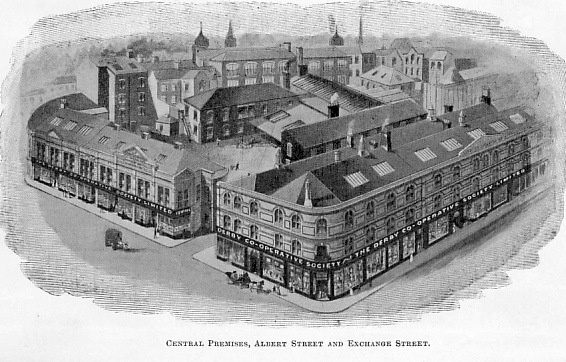
The "yard," which has been incidentally so designated, is in reality a
serious and not a frivolous interior. It is the dwelling-place of vehicles
of all kinds and stores of all descriptions. In its various buildings,
the commissariat departments
of all the branches were established. The yard was full of business life
every hour of the day, and often well into the night.
The Derby co-operators were not only economists in
business—they were economists in celebrations, and no ceremony is
recorded when successive blocks were opened. The habit was to have a large
party at the Drill Hall every Shrove Tuesday, and one of these meetings
was made to serve for a public celebration, when one became due. But in
1876 the Shrove Tuesday Annual Tea Party took place in their new
Co-operative Hall, which was crowded above and below, by one company
succeeding another. Even the juvenile members of co-operative families had
their entertainment. In the evening speeches were made, and the president,
Mr. Hilliard, took the chair. Alluding to the practice of town grocers
giving a present of a few candles to their customers at Christmas as a
reward for their custom during the year, he said "The Co-operative
Society had given their members no candles, but had given them £7,196,
which would furnish them with burning and shining lights all the year
round." He said, what every society does not understand yet, namely, that
"The women must lead in this movement, for co-operation is essentially
a woman's question. The dividends paid during the year had clothed many a
child and brightened many a
home. It was the duty of every member to increase his or her income. England itself was of the nature of one great society, and it behoved
everyone to increase its wealth, and the man who does nothing does not
enrich the country, but takes from him who does. If everybody did their
fair share of work, he
and they would have to do a great deal less." All this was brightly and
admirably said.
The annual report announced "the establishment of a Building Department in
connection with the society. Already 14 houses had been erected, and four
previously built had been allotted to members; and about six acres of land
had been bought which would hold about 200 more. The land had been drained
and streets marked out. The branch of the Meat-making
Department had been opened on the Normanton Road. The new buildings in
Albert Street, in Princes Street (since named Exchange Street), were near
completion, which, when finished, would be the best block of buildings for
business purposes in
the town." It was stated, that by means of the Education Fund, they had
started the Derby Co-operative Record for the better information of the
members and the public. There was then in active operation, twelve
branches in the Grocery Department, three in the Butchery (in this
narrative
always spoken of as the Meat Department), three in Bakery, and one each in
Drapery, Boots, Tailoring, and also two Coal Depôts.
In the new building, the society possessed a large Lecture Hall of good
dimensions, which contains a portable gymnasium for the use of members,
when lectures, or concerts, or tea parties are not on. "A country," says
Mr. Goldwin Smith, "without towns or cities, or stately edifices, little
impresses the traveller, and never commands his admiration." This is true
of co-operation—without stores of some mark and dignity, neither its
importance, vitality, nor prosperity, is made manifest. Co-operation in
Derby fulfils these conditions.
From various causes the dividend was low in 1872, being only 1s. 6d. in
the £, made up from the Reserve Fund, it being understood that the amount
taken from the fund be replaced when the profits exceed 1s. 6d. In 1873
the dividend declared was 1s. 10d. in the £. By this time the amount
borrowed from the Reserve Fund, in July, 1872, will have been repaid. As
late as 1875, a dividend of 2s. was realised. The names of persons
admitted as members are still recorded in the minute book, as instance
Mary Grocott, Mary Hill, Messrs. Harrigen, Toft, Topley, Hines, Hindley.
The Monthly Record for information of members, was established in this
year. The public annals of the society commence in 1876. The Editor calls
attention to the Penny Bank. The Albert Street extension is beginning to
present a noble front. The fourteen houses and stores at California are
progressing satisfactorily.
Elsewhere branch operations are going on. Mr. Blood's tender for the
erection of property in Parliament Street and Stockbrook Street is to be
accepted. The committee justly consider, owing to time having been wasted
from causes known—the period of the contract be extended, and the fine
for non-fulfilment reduced from £10 to £5 per week. This year (1876) the
Building Department began. County votes were claimed and conceded.
|
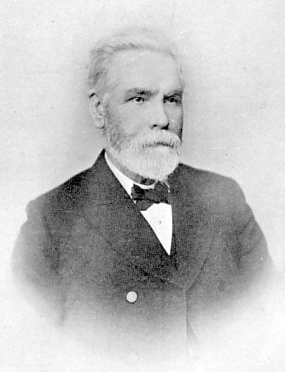 |
|
R. HILLIARD,
J.P., Manager. |
The committee have been struck by a remark made at the Leicester Congress
by Mr. John Ellis, chairman of the Midland Railway, which Mr. Hilliard
commended, in one of his many speeches to branch meetings. Mr. Ellis,
speaking in a Chapel where the meeting was held, said: "It was not often
they saw a member of the Society of Friends in anything like a pulpit,"
then he made wise remarks which attracted attention in Derby. He said "success with co-operators as in every other kind of business, depended on
the management and in an eminent degree on confidence. His own interest in
their work arose from the fact that he regarded it as a movement in favour
of self-reliance, thrift, and a desire to make the best use of the means
which they, as hard workers, received as the result of their labours." Thrift, which Mr. Ellis justly commended, had
been a characteristic of Derby co-operators. Profit-making does not go far
unless Profit-saving accompanies it. This was the case in Derby for at
this time, 1876, the society had in deposit, with the Wholesale Society,
£5,000.
In the September quarter of 1877 the cash taken for goods sold was
£23,800—substantial business was being done now. Well might Mr. Hilliard
announce in the December following "that the society had been one
continued increase quarter by quarter."
A pleasant account is given in the Record, in 1878, of social life at the
Albert Street Tea and Coffee Room, opened on Saturday evenings. Mothers
and children were there, enjoying the warm refreshments; the husband was
at hand, reading the newspaper, others playing at chess and draughts. This
year a Penny Bank meeting was held, when 150 children sat down to a tea. The president of the society, Mr Hilliard, gave demonstrations in
phrenology, supplemented by a wise and genial address, and told a charming
story to the children.
In 1878 the dividend paid to members for the year amounted to £8,948. The
dividend to non-members was £220. What a miracle non-members are! Every
such person can become a member simply by consenting that the full
dividend he will then receive upon his purchases shall be applied to the
payment of a £1 share, which he will own, and receive 4 per cent interest
upon it, and ever after he will be entitled to the full dividend. Thus,
the non-members who now receive £220 would receive about £440. The wonder
is that persons so needy and greedy as poverty makes them will persist in
refusing £220 a year, which they might have. Such is the costly
eccentricity of ignorance.
For years before this, since 1872, the Co-operative News was sold at each
store and the profits divided among them to extend information among
non-members. In some societies the education committee sell the paper at a
halfpenny for this purpose.
But despite the stupidity of poverty, which in some quarters
prevailed—the good fortune of the society advanced. The editor of the
Record described 1877 as the most eventful and prosperous year in the
annals of the society. Their extensive premises in Albert Street and
Princes Street were opened, and new stores in Parliament Street and at Alvaston. That year the building department was active. That year all the
departments, millinery, dress, and mantles, were flourishing. The sales
for the year had been £98,000.
At the annual tea party in 1882 it was announced that the sales for the
past year exceeded £101,000. The profit realised exceeded £6,600. In that
year Mr. Hilliard was still president, and Mr. Swift, secretary.
The society, in 1884, about to erect 40 cottages in Cotton Lane, held a
tea party in St. Dunstan's Schoolroom, lent by the courtesy of the Rev. C.
H. Molineux. Mr. Scotton being called upon to speak on "Co-operation and
Thrift," he argued that difficult as was saving to working people, it was
possible
to them. The profits realised by co-operative societies were proof of it. About that time Lady Manners had told the world that "many ladies spent
£600 a year on their toilets alone, and £1,000 on dress, and £2,000 on
flowers for a single ball." Though the upper classes, as they were called,
set the people no example of frugality, the people must be an example to
themselves. That was the policy of self-helping co-operation.
Such was the extraordinary growth and opulence of the society, that the
leaders of the movement resolved to hold its sixteenth Congress there. The
paramount success of the society justified this, and Mr. Scotton's summary
of the position at that time well shows it.
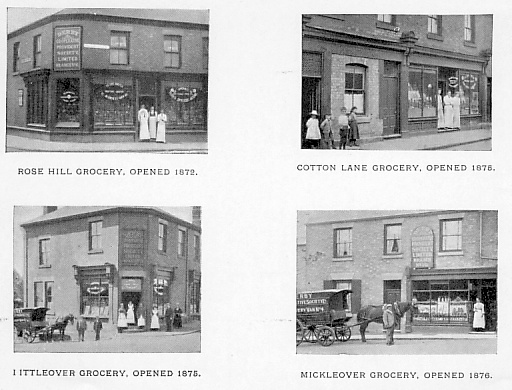
The capital of the society now stood at £70,566. During the ten years
between 1874 and 1884 the society had paid to
its members dividends to the amount of £80,000. At this time, which
was the Congress year, the year's receipts for sales were as follows:—
|
|
£ |
s. |
d. |
|
Grocery and Provisions |
64,174 |
0 |
1 |
| Meat |
17,099 |
13 |
1 |
|
Drapery |
5,104 |
8 |
1 |
|
Millinery |
1,218 |
2 |
10½ |
|
Tailoring |
2,653 |
13 |
0 |
|
Boots and Shoes |
4,038 |
9 |
5 |
|
Furniture |
1,388 |
14 |
6 |
|
Jewellery |
48 |
7 |
1 |
|
Coals, in Loads |
3988 |
0 |
8 |
|
Coals, in Bags |
3,716 |
16 |
10 |
|
TOTAL |
103,440 |
5 |
7½ |
Profits realised during 1884 from all sources were £15,400. Subscriptions
to charitable and other objects £78, to Education Account £104. Seeing
that business folly nor ignorance could have made £15,000 of profit, £104
for education was certainly a limited concession. It was not understood
then, that intelligence is an investment which pays the highest dividend.
But this year was memorable for the first recognition of the principle of
participation in profits with employees. A recognition much in advance at
this time (1900) of many societies of pretension and importance. At the
quarterly meeting, Mr. Hilliard, the chairman, drew attention to the
Seaton Delaval Society, whose trade with the store amounted to an average
of £11. 11s. per member; but in Derby the average was a little over £5.
15s. per member. Mr. White pointed out that the Seaton Delaval Society
traded much more with the Wholesale Society than the Derby Society did,
which accounted for Seaton Delaval paying a dividend of 2s. 10d., while
the Derby Society paid only 2s. There were other reasons in the case.
Trading with the Wholesale was always a question of interest with the
Derby members. Fourteen years earlier the society resolved that the number
of shares in the North of England Co-operative Wholesale Society (which
the society had joined in 1867) be increased in consequence of the
increase in the number of members. The same year delegates were sent to
the Wholesale Society meeting for the revision of their rules. This was
the first time such delegation
had been made. In 1889 the purchases from the Wholesale for one quarter
were £8,852.
Still the society went forward as though the committee of management wore
seven-leagued boots. Next year Mr. Hilliard, at the quarterly meeting,
stated there had been an increase of members from 1,400 to 1,700 in the
Children's Saving Bank. Again, in 1887, the chairman announced that the
sales for the quarter had been more than £28,000, an increase of more than
£500 in the corresponding quarter of last year.
Among almanacs issued by the society, that of 1888 was deemed the best, as
indicating the success it recorded. It bore the title of "Victory." The
society certainly had grounds
for triumph. The success of co-operation had not only made its mark, it
had written its name in full in Derby, in a legible hand and the cause was
making itself felt throughout the county. Handel Cosham, M.P. for Bristol,
suggested that "We might do away with half the public houses and use the
other half as co-operative stores." The society had now grown
more intelligent in 1888 than it was in 1863. At the invitation of the
committee 150 employees sat down to tea in the large
hall in Albert Street. In 1863 when the committee voted £5 that the
employees and committee were to dine together on March 10th, on the
occasion of the Prince of Wales' marriage with the Danish Princess "from
over the sea"—the shops were to be closed and the shopmen to receive
their wages.
This was a graceful idea, honourable to the committee. But some unlovely
member (such as existed in those days among the working class) who could
not bear the idea that those who served them in the store should have any
enjoyment, went among others who had, or were induced to take a like view,
and got the vote of the committee disallowed, or reduced, at a
meeting of members. That class who do not know how to be generous
employers, were happily extinct in 1888, and the committee were able to
invite 150 of those who mainly make the fortunes of the store, to dine
with them. Under good management and good service, all departments of the
store flourished. In 1890 the amount taken in the Drapery department alone
for one week, at the end of November, was £403. 10s.
It is not possible to record in a portable book all the events and
incidents of half a century. But a consecutive and brilliant table of
progress can be given for a long historical period. Mr. Scotton, with no
mean labour, has hunted up all the old, scattered, and forgotten balance
sheets, and with Mr. Rest has succeeded in producing a table of the
financial progress of the society for nearly 40 years. Some documents
appear to have survived from which the position of the society can be
indicated in 1862; but there are no means of giving
accurate statements for the years 1863, 1864, and 1865. It is common in
the earlier co-operative societies for the directors not to foresee the
progress possible to them, nor to think that
their humble balance sheets in the beginning may be of interest in the
future. Mr. Scotton's table shows the steady advance of the society for 34
years, under the instructive heads of members, capital, sales, profit,
education, and charity.
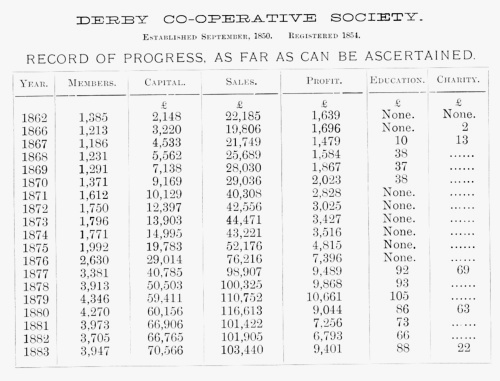
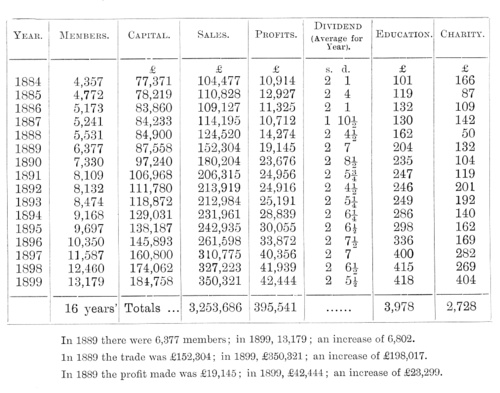
The reader has now before him a bird's-eye view of the progress of the
Derby Co-operative Society. It is known that night birds have eyes twice
as large as day birds; but a day bird can see the significance of these
eloquent and informing figures.
The Origin and Growth of the Branches.
CHAPTER X.
IT was Petrarch (if I remember rightly) who
apologised for writing a long letter, for the reason that he had not time
to write a short one. I have taken time to give the reader so far, a
short history of the chief events of fifty years' experience in the rise
and growth of a great store. It is easier to be prolix than to be
brief, yet brevity is a merit in this day of multitudinous activities,
providing the brevity is free from obscurity. It is of no use to put
a subject into a nutshell, unless a writer is sure that his readers are a
species of intellectual squirrels, who have time and teeth to crack the
nut. My object has rather been to hang the fruit of facts on
branches which bend low down, so that the busy man can pluck it without
trouble or delay. If even dainty fruit is hung too high, it will
never be gathered, save by readers of forethought and enterprise, who
carry ladders with them.
Fortune lies in wait for some persons, and befriends them on
the high road. Before others the goddess retreats to a "two-pair
back," where few find her. But the Derby co-operators found her
secreted in stables and lofts, in out-of-the-way yards, and they had to go
up narrow, steep, clumsy stairs, to find her. But since the Albert
Street Stores were built, the capricious goddess has shown more taste,
affableness, and courtesy, and is found now in front shops, and does not
disdain to visit the branches, distributing her bounty there.
There is no doubt a science of Co-operative Agriculture which
deals with the provision of select soil, and unadulterated seed, suitable
for the germination of branches. There is an art of branch sowing,
with well defined methods for the preparation of the soil favourable for
the seed to take root in, and a knowledge of certain chemicals, of the
nature of judicious speeches, calculated to nourish the seeds, and promote
their growth. We have an Agricultural and Horticultural Association
at Deptford, which deals with these things according to nature, which,
however, have their similitudes in propagandism. The Derby Society
have proved no mean masters of the art of co-operative agriculture.
It is a difficult art, because of its newness, to learn and apply, but by
perseverance, it can be acquired, and by skill and judgment great results
can be obtained. If at the exhibitions at the Crystal Palace
Festivals, there could be an Exhibition of Branches, Derby would take many
prizes.
Nobody surmised that the soil of Derby was naturally
favourable for this growth. But the Central Society sent out capable
explorers and prospectors, who discovered Klondike deposits and South
African gold fields of the co-operative kind, in Derby and its outlying
suburbs, which no one suspected.
At first, branch sowing yielded but a thin crop, which
scarcely showed its head above ground. But good tilling told, and at
length local stores were like Topsy, who accounted for her existence by
saying she knew nothing about being born, she "'spected she growed."
Stores seemed to spring out of the ground, after Full Street, where the
seeds of expansion were first sown. When the Carpenter Store first
took in the public, the natural fecundity of the Derby soil was revealed
and stores sprang up in many streets. No doubt when the plant was at
last observed above the earth, it was tended and watered from time to
time, until it attained self-sustaining development. The growth of
Stores and Departments will strike the reader as manifesting wonderful
spontaneity. Cooperative fertility became the marvel of the day.
Dead leaders who stood up for principle while living, have potency after
death, and it may be said of them, as was said of less useful saints, that
their bones worked miracles at their tomb. The example they had set,
the inspiration they had diffused, the co-operative seed they had sown,
were found to have a self-raising capacity. It was finely said at a
later period "Co-operation knows no frontier—it is meant for mankind."
Experience shows it can be acclimatized in any city or town, in any
district or in any land—where the people have discernment, zeal, and
patience. The Derby pioneers, when they went into what Lord Hampton
called "the open," planted orchards and ploughed fields, and, happier than
the poor husbandmen in competitive regions, they gather the fruit they
have grown, and reap the harvests they have sown. From minutes and
the Monthly Record of the society, pages may be filled with many
instances illustrative thereof.
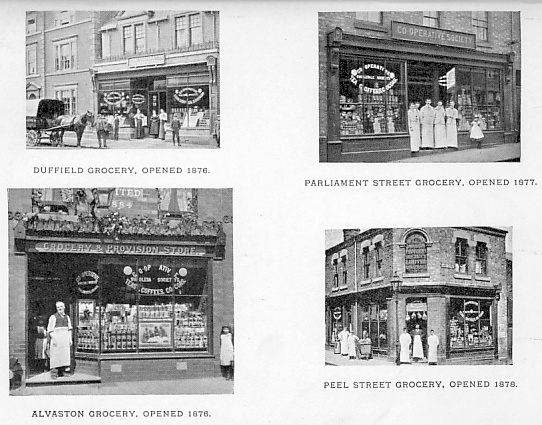
As early as 1864 inquiries were made as to the feasibility of
setting up a branch in Cotton Lane. In 1865 new Stores were still in
the minds of the committee of management, who seemed like the typical man
of business, to sleep with one eye open in order to see how the main
chance is moving—the "main chance" with the committee was the chance of
establishing new branches.
In 1871 the committee were empowered to purchase the piece of
land at the corner of new street called Harriet Street. In June of
the same year "cottages are to be built on the spare land in Harriet
Street." In July, plans are ordered to be prepared for Rose Hill
Branch. A year later the rent of the houses in Harriet Street is
fixed at 3s. 6d. a week; and the Nun Street property is to be insured for
£300, and the Rose Hill and Bridge Gate property are to be insured—Rose
Hill property, building stock, and fixtures, for £1,150.
In 1865 "Cotton Lane was to be opened by a Tea and Public
Meeting if rooms can be had." In 1866, a Store was opened at Bridge
Gate. 1868, a Branch Store was to be opened in Abbey Street.
In 1873 it was found necessary to make a thoroughfare through Thorntree
Lane, and the committee are to consider how it can best be done. In
1875 "The shop at Allestree is to be taken. The Rev. Mr. Frith to be
written to." In the same year "Land is to be bought in Parliament
Street, belonging to Mr. Copstick, and a deposit is to be paid by the
Estate Committee." In 1876 Mickleover Branch (the first branch
mentioned in the Monthly Record) was opened. Mr.
Hilliard was chairman of the meeting. The villages were calling for
branches. A meeting was held in the open air at Duffield, addressed
by Scotton, Swift, Garrett, and Eyre. Three members of the committee
were appointed to inquire into the desirability of opening branches in the
localities with which they were familiar—Littleover, Allestree, and
Cotton Lane. In 1876 instructions were given to Messrs. Eyre and
Garrett to take steps to open a branch store at Duffield.
Alvaston Branch was opened and celebrated by a large meeting.
In 1886, Alvaston has done a trade of nearly £8,000, and has received in
dividends £720. Duffield has received dividends of £728.
Littleover has received £756. In that year Cotton Lane, which had
been precariously mentioned in 1865, had attained to substantial notice.
The chairman stated "they were building 33 houses on their Cotton Lane
Land." In 1890 we read that "the New Shop built on the site of the
old one in Duffield was opened." Again, in 1891, we are told that
"the rebuilding of the Duffield Branch resulted in a great increase of
trade."
The reader has seen similar notices to these in various
pages. Indeed, they are scattered everywhere about the minutes and
publications of the society's proceedings, but not repeated here, to
obviate the monotony of their collected repetition. Mr. J. B. Rest,
the secretary, has compiled me an excellent Table of the Branches,
including the dates of their origin, their cost, the first and last year
of their business, to September, 1899. The reader will find the
Table at the end of this chapter.
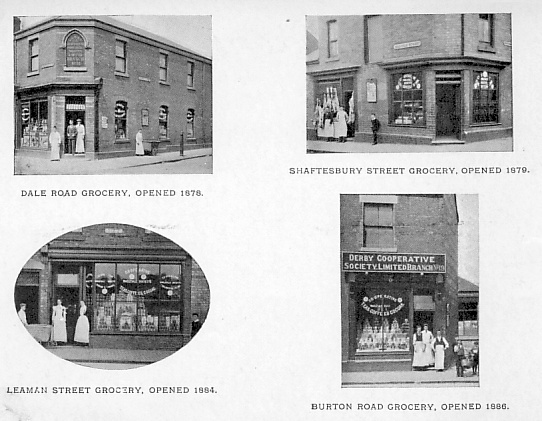
The most picturesquely situated store is Bridge Gate.
It occupies part of the old Toll Gate. Could we recall all that has
been witnessed from those windows, what myriad memories of love and
tragedy, intrigue, and business would be revived! What historic scenes
has the Derwent presented upon which the Bridge House looks down! The date
of the Bridge Gate house—the date of the Bridge is conceivable, but the
Derwent is as old as England, and every yard of its banks has its romantic
history to those conversant with its past. The building occupied by the
store is irregular, with its makeshift rooms. Were it the property of the
co-operators they would soon rebuild it, and make it convenient and
graceful. Yet in such alterations as it has been possible to make, there
are light and cleanliness. These excellencies of co-operative trade are to
be observed in all the stores. In whatever state of confinement,
confusion, and ramshacklement a building was found to be when the
co-operative occupation of it began, changes were made as far as possible
in respect of light, space, drainage, and ventilation. It will be seen in
another chapter that the Building Department had always similar
considerations in view.
One or two societies were acquired which originated
independently, but without self-growing power, such as Little Eaton, taken
over in 1896, and Spondon in 1897. Spondon had been in existence 23 years
and Little Eaton 16 years when they were taken over, both at a valuation.
Both were struggling little stores. Spondon and Little Eaton are two
villages three miles from Derby. These societies were going down and would
soon have been extinct. Now, as branches of the Derby Society, they are in
a flourishing condition both as regards trade and profit.
There is the case of another addition to the list of branches. The
Melbourne Society, seven miles from Derby, had been in a poor state for
years and it is likely the members will lose all the capital they have in
it. The Derby Society have agreed to take the society over, which will be
done in this Jubilee year, and instead of having no dividend they will
have the same as the Derby Society, which averages 2s. 6d. in the £. These
societies are not annexed by any Bartle Frere process. No Rhodes and
Jameson Raid is organised against them in Derby. Overtures from them are
first made, a sort of William Penn Treaty follows and the interests valued
and paid or guaranteed before their occupancy is effected.
The good feeling of cordiality and loyalty existing between the branches
and the Central Society is due to wise, considerate, and to use a phrase
common among diplomatists at this time—"tactful administration." In
ill-governed countries there is always a party who are "against" the
government, because the government have always been against them. In
Sicily there is the Mafia Society which represents an unorganised but
perennial hostility to the governing class and all its ways. In Naples
there are the Camorra, a like irreconcilable class who are unappeasable,
because they are hopeless. There are
no Mafias or Camorra among the 37 outlying branches. They have all one
interest of common privileges and common advantages. There can be no
better tribute to the wisdom of management with which their affairs are
conducted.
The creation and federation of branches is the sign of a great society
possessing the propagandist spirit. The object of this chapter is to give
the reader some adequate conception of the extent to which this work has
been accomplished. Every branch has a history of its own, did space permit
of it being written here, a delightful and instructive book might be made,
by recounting in detail the origin, vicissitudes, growth,
and fortune of branches, and the men who built them up. A deserved
recognition in co-operative annals is due to them.
The numerous branches and departments all have managers and assistants,
and on their good sense, willingness, and courtesy, the welfare of the
society depends. The success of a branch is largely owing to the manners,
patience, and willingness, of those in charge of its business. Purchasers
naturally expect consideration as well in the shop of their own, as in the
shop of a private trader. Every customer is of the nature of a patron,
custom supports the movement in commercial respects, and he who gives his
custom, helps in making the business profitable. A forbidding countenance,
irritability, or impatience, on the part of those who serve, soon
alienates purchasers, who will not go where they think themselves
unwelcome or troublesome. A thoughtless remark which gives pain, will
create dislike, sometimes a mere tone will do it. Of course the duty of
being equable on the part of servants who are as busy as they can be, is
very difficult, and this constitutes the great merit and value of those
servants, who possess and exercise these qualities. They make the fortune
of a branch. Officers of this character deserve great praise and permanent
appreciation. In the early days of co-operation, the managers and shopmen
had co-operation in their hearts, and their geniality was so natural to
them, that purchasers liked to go to the store, they were made to feel
that the shop was their own. The contrast between buying there, and in the
shops to which they had been accustomed, was very pleasant to them. Those
who served were not merely the servants, they were the friends of the
customer. Business was not competition, it was fraternity, the movement
owes everything to its managers and servants.
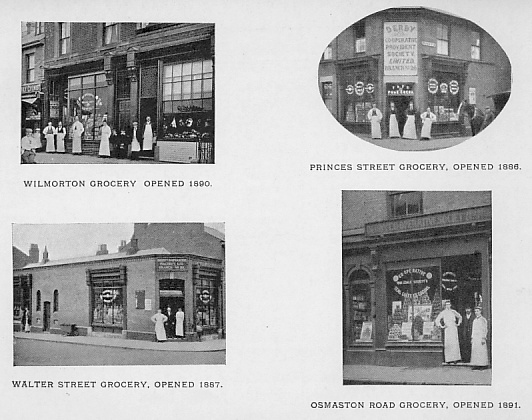
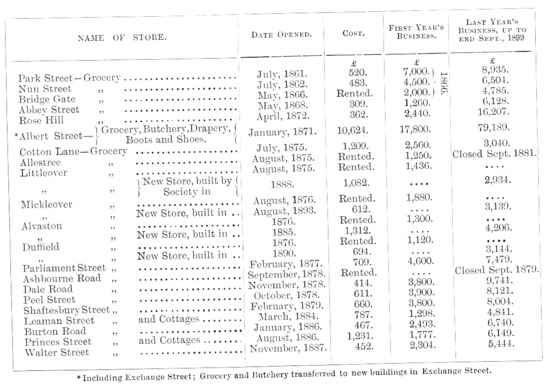
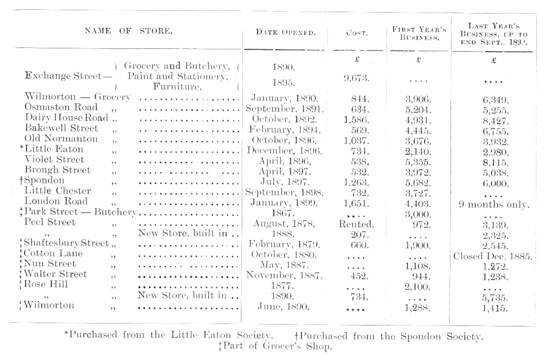
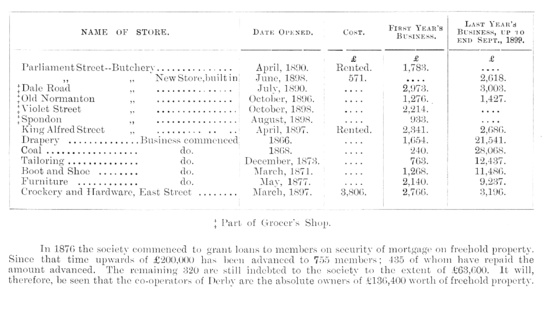
[Next Page] |